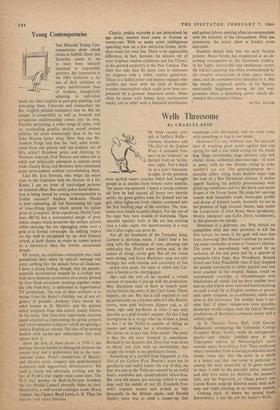Wells Threesome
Ily CHARLES E OF three current revi- vals at Sadler's Wells— Carmen, Idomeneo and The Girl of the Golden West-1 attended Car- men on an 'ordinary' as distinct from an 'invita- tion' night. Not a black tie or a nob's limousine in sight. In the precincts were parked motor coaches which had brought people in at teatime from remote outer suburbs. The house was jammed. I heard a young cockney tell how he had queued all hours two months earlier for good gallery seats for himself and his girl. After lights-out lively chatter continued into the first bustling page of the oyerture. The chat- terers were hissed to guilty silence. For the rest of the night they were models of intentness. These splendid operatic facts of life are less exciting than a Callas night, but heartwarming in a way that Callas nights can never be.
For all the brashness of the Toreador Song, Carmen is patrician music. I didn't hear a bar sung with the refinement of tone, phrasing and mind-play that Bizet's score invites and, in the nature of things, rarely gets. But all the voices were strong: and Joyce Blackham sang not only strongly but with stamina and continuity of line —pretty rare assets, for want of which any Car- men is beaten at the starting-gate.
She—and the rest of us—needed a certain amount of stamina to put up with the production. Miss Blackham used to have to munch sand- wiches before her entry in the Card Scene. These, happily, are out. But she is still required to curl up gratuitously on a kitchen table in Lillas Pastia's tavern, wear pink ballroom slippers and, at all times, ogle and hip-flaunt in what I can only describe as a pink boudoir manner. All this I find incongruous in a virago who (as witness a detail in Act I at the Wells) is capable of felling an enemy and making her a stretcher-case. . . . No matter or, at any rate, little matter. The point is that the old story 'worked' to admiration. Hooked by his dynamic slut, Don Jose went down to blood and ruin with an inevitability that caught the breath in my pernickety throat.
Something of a parallel kind happened at The Girl of the Golden West. Puccini's score has its gaucheries and sickly layers. On top of this, the first two acts at the Wells are marred by an awful bum's wardrobe and claustrophobic bric-a-brac. But once the drama got moving (which it rarely does until the middle of Act 11), Elizabeth Fret- well's soprano soared and arched so full- throatedly in the Minnie music, and Donald Smith's tenor was so close a runner-up, that handicaps were discounted, and we came away with something to hug in our minds..
Idomeneo is a very different case. No question here of weighing good points against bad and opting for half a loaf while crying for the whole hog. Stage movements, stage pictures, solo and choral voices, orchestral interweavings: all meet as peers, with no one element trying to poke another's eye out. The general-purpose set— movable pillars rising from shallow steps—has the look of a Ben Nicholson abstract. It makes superb backing for priestly processionals with glittering candelabra and for the block-and-tackle drapes of the Storm Scene. Ilia sings her opening lament with hierarchic tread, moon-pale profile and droop of fettered hands. Instantly we are in the presence of high classical theatre, and, under the compision of Glen Byam Shaw (producer), Motley (designer) and Colin Davis (conductor), in this presence we remain.
Idomeneo is a poltroon, yes. Why should we sympathise with one who promises to kill the first human he meets if the gods will save him from drowning? But Mozart's sublime yet search- ing music reconciles us even to Varesco's libretto. The score is marvellously well served by an orchestra all fire and poise and by a quartet of principals (Ava June, Rae Woodburn, Ronald Dowd and John Wakefield) who, if they dropped the present translation (a rather painful one) and were coached in the original Italian, could be transplanted overnight to Glyndebourne with felicitations all round. Let me burn another boat and Say that I have never seen and heard anything on such a scale by an English resident or perma- nent opera company as co-ordinated, subtle and alive as this Idomeneo. Yet another boat. I sur- mise that, if direct comparison were possible, ldomeneo would eclipse even the fabled Mozart productions of Beechain's company nearly half a century ago.
In St. Pancras Town Hall, with George Badacsonyi conducting, the University College (London) Music Society made an outrageously plucky—and wholly justified—pass at the Tcherepnin edition of Moussorgsky's rustic comedy opera Sorolchinizy Fair. They confirmed what I remember from a touring production about twenty years ago, that the score as a whole is a honey and that one scene in particular is among the most successful of its genre known to man. I refer to the adorably naïve, innocent and silly love scene for Khrivia, the peasant's wife, and the Popovitch, or village priest's son. Carole Rosen sang the Khrivia music with rich- ness and truth startling in an amateur context.
Coming back to where we started from, Sorotchintzy is just the job for Sadler's Wells.






































 Previous page
Previous page